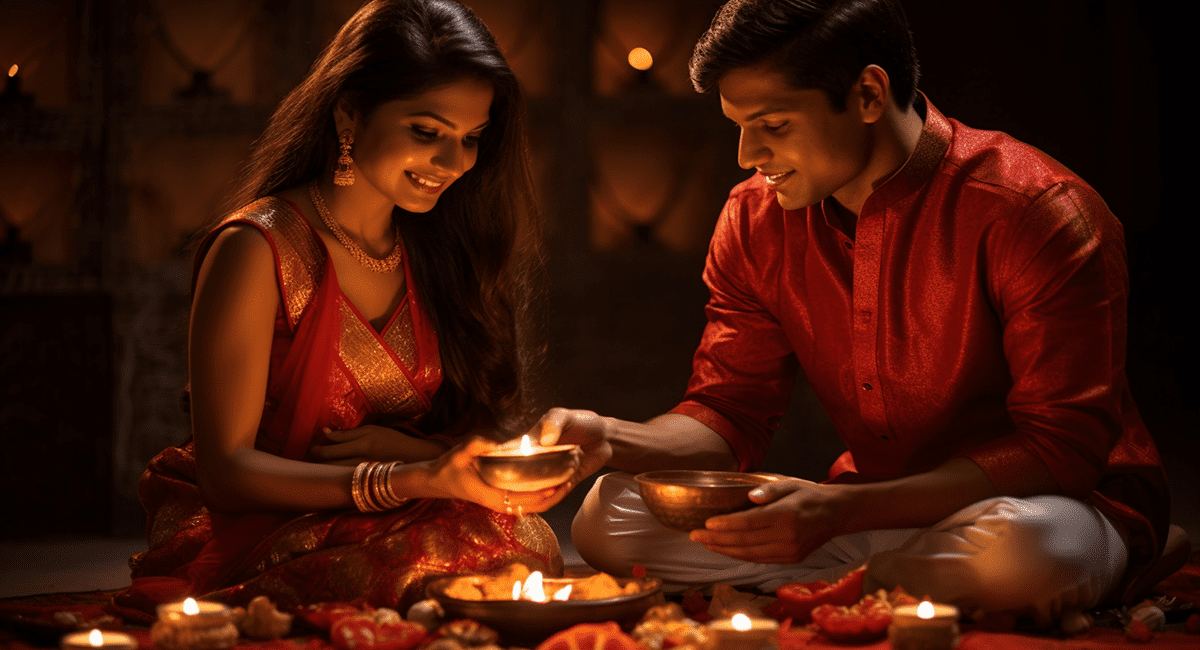Karva Chauth, a significant Hindu festival, is celebrated by married women across Northern India. It holds a special place in the hearts of couples, symbolizing love, devotion, and a prayer for the well-being and longevity of one’s spouse.
Karva Chauth Date 2024
Sun, 20 Oct, 2024, 6:46 am – Mon, 21 Oct, 2024, 4:16 am
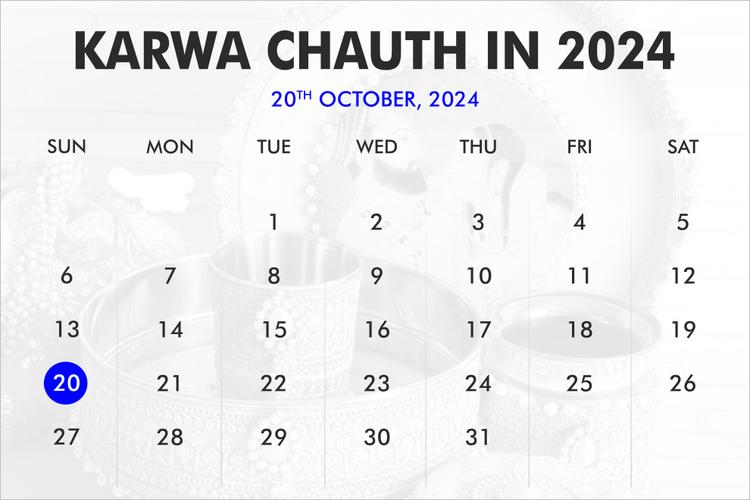
Karva Chauth Story
Once upon a time in the kingdom of Pratibandapuram, Queen Veervati observed a rigorous fast on the day of Karva Chauth, with the hope of ensuring her husband’s well-being and longevity. However, as the day wore on, the Queen grew weak and faint from hunger and thirst.
As the day neared its end, Queen Veervati’s seven brothers, unable to bear seeing their sister in such a state, decided to play a trick. They created a false illusion of the moon rising behind a mountain, deceiving the Queen into believing that the fast could be broken.
Believing the illusion to be the moonrise, the Queen mistakenly ended her fast. Just as she took her first morsel of food, news arrived that her husband, the King, had met with a grave accident.
Devastated by the news and realizing the deception, Queen Veervati rushed to her husband’s side. Her devotion and love for him moved the divine forces, and by the grace of Goddess Parvati, her husband was miraculously revived.
This tale of love, devotion, and the miraculous reunion of Queen Veervati and her husband became the cornerstone of the Karva Chauth tradition. It symbolizes the selfless love and dedication that married women have for their husbands.
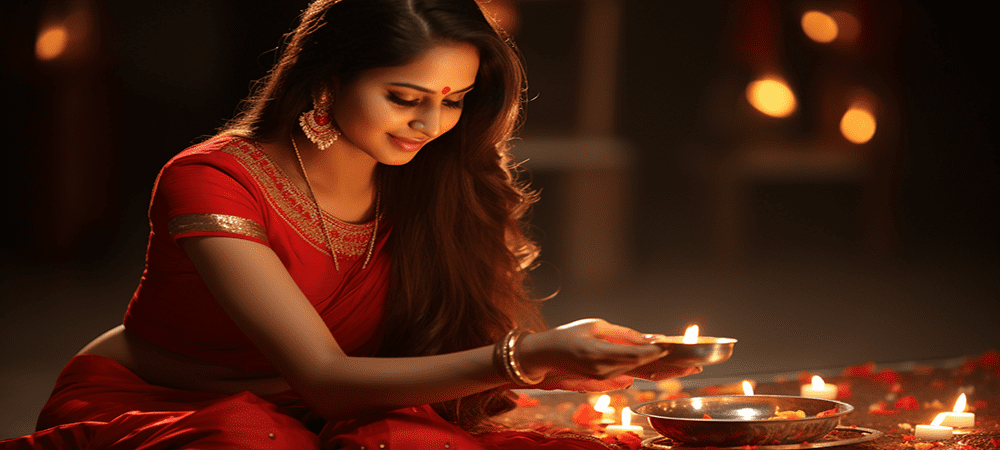
Significance of Karva Chauth
History and Tradition
The roots of Karva Chauth can be traced back to ancient times. It was a way for women to pray for the safety of their husbands who were away for battle or trade. Over time, it evolved into a celebration of marital happiness.
Cultural Importance
In Indian culture, Karva Chauth is revered as a day when married women observe a day-long fast, refraining from food and water, to express their love and dedication.
Preparations and Rituals
Fasting and its Purpose
The fast begins at dawn and continues until the sighting of the moon. Women consume a pre-dawn meal called ‘Sargi’ that provides them with energy for the day.
Traditional Attire and Accessories
Women adorn themselves in vibrant traditional attire, often donning the sacred color of red, and embellishing their hands with intricate mehndi designs.
Puja Vidhi (Rituals)
As evening approaches, women gather to perform the Karva Chauth puja. They offer prayers to the moon, seeking its blessings for their husband’s well-being.
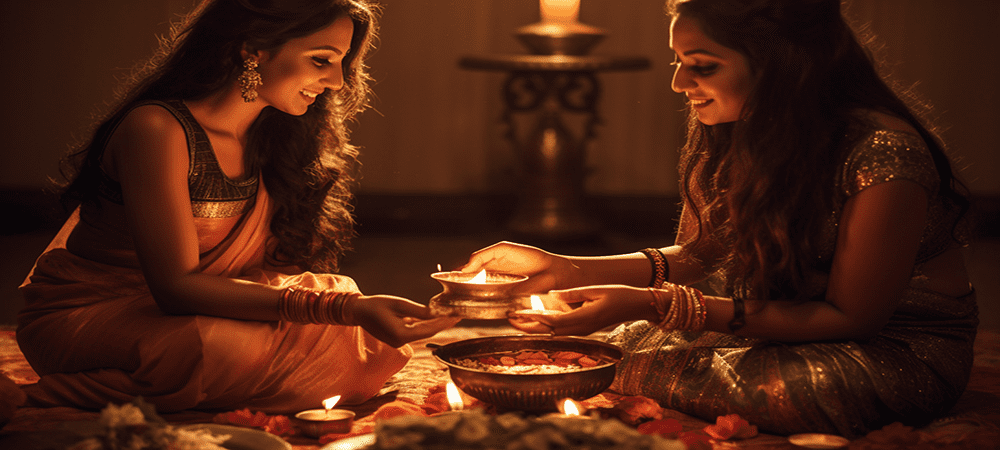
Celebrations and Festivities
Gathering of Women
In the evening, women come together in a communal spirit, forming a bond of sisterhood as they wait for the moon to rise.
Exchange of Gifts
Husbands express their gratitude by gifting their wives with tokens of appreciation, strengthening the bond of love.
Decorations and Rangoli
Homes are adorned with vibrant decorations, and intricate rangolis are drawn at the entrance, symbolizing prosperity and good fortune.
Modern Perspectives on Karva Chauth
Changing Traditions
In recent times, there has been a shift in the way Karva Chauth is celebrated. Some couples choose to modernize the rituals while retaining the essence of the festival.
Feminist Debates
The festival has also been a subject of feminist discussions, with varying opinions on the empowerment and choices of women in this tradition.
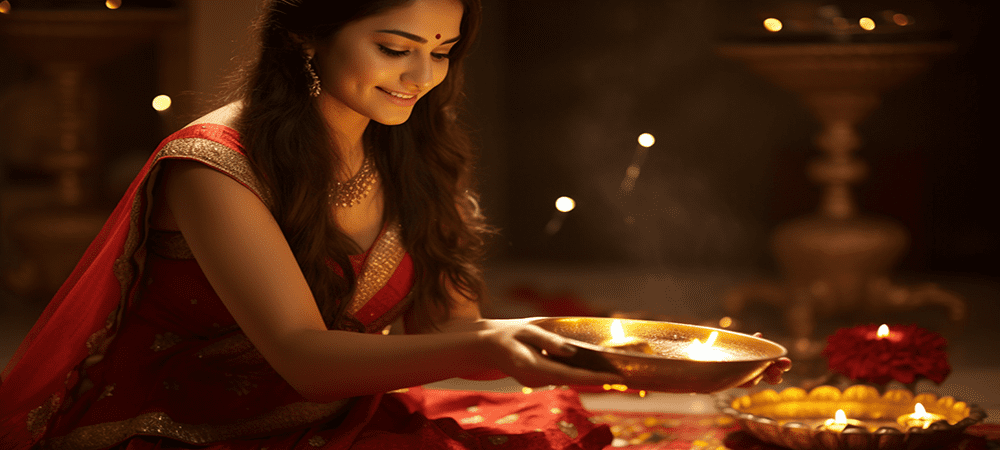
Regional Variations
Karva Chauth is celebrated with unique customs and fervor across different regions of India. Each locale adds its distinct touch to the festivities, making it a culturally rich experience.
Karva Chauth in Popular Culture
The celebration of Karva Chauth has found its way into Indian cinema and literature, often portraying it as a beautiful representation of spousal devotion and the celebration of love.
Recipes for Karva Chauth
Sargi (Pre-Dawn Meal)
The Sargi meal is meticulously planned, including a variety of dishes like fruits, nuts, sweets, and nutritious foods to sustain women throughout the day.
Post-Fasting Delicacies
Once the moon is sighted, the fast is broken with a delightful spread of sweets and savories, celebrating the successful completion of the day-long fast.
Karva Chauth in the Digital Age
Social Media and Celebrations
In today’s digital age, the celebration of Karva Chauth has found a new platform on social media, where couples share their love and dedication with the world.
Online Shopping Trends
With the ease of online shopping, the preparation for Karva Chauth has become more convenient, allowing women to choose from a wide array of traditional attire and accessories.
Challenges and Controversies
Health Concerns
While the festival holds great significance, it’s crucial to acknowledge the health implications of fasting, especially for those with specific medical conditions.
Societal Pressures
Karva Chauth has been a subject of debate, with some arguing that it may perpetuate certain gender norms and societal pressures on women.
Global Influence of Karva Chauth
Indian communities around the world celebrate Karva Chauth, transcending borders and keeping alive the rich cultural heritage.
Karva Chauth and Bond of Love
Beyond the rituals, Karva Chauth is a testament to the enduring bond between spouses, strengthening their relationship and creating cherished memories.
Evolving Traditions: Inclusivity and Change
As society evolves, there is a growing movement to make traditions like Karva Chauth more inclusive, respecting individual choices and preferences.
Conclusion
Karva Chauth remains a celebration of love, devotion, and the enduring bond between spouses. Its significance continues to evolve, adapting to modern times while preserving its cultural essence.
Frequently Asked Questions (FAQs)
Is Karva Chauth only celebrated in North India?
No, while it is most prominently celebrated in North India, its popularity has also spread to other regions.
What is the purpose of Karva Chauth?
Karva Chauth is observed by married women as a day of fasting and prayer for the well-being, longevity, and prosperity of their husbands.
Which day is celebrated as Karwa Chauth?
Karva Chauth is celebrated on the fourth day of the Kartik month in the Hindu calendar, which usually falls in October or November.
What is the first Karwa Chauth tradition?
The first tradition of Karva Chauth is the observation of a day-long fast by married women from sunrise to moonrise.
Who invented Karwa Chauth?
Karva Chauth is an ancient Hindu tradition with no specific inventor. It has evolved over centuries and is deeply rooted in Indian culture and traditions.
Is it necessary to take a bath before sargi?
While it is not a strict requirement, taking a bath before sargi is considered auspicious and is a common practice followed by many women.
Which God is Worshipped in Karwa Chauth?
Goddess Parvati, the epitome of marital devotion and strength, is worshipped on the occasion of Karva Chauth. Women seek her blessings for the well-being of their spouses.

